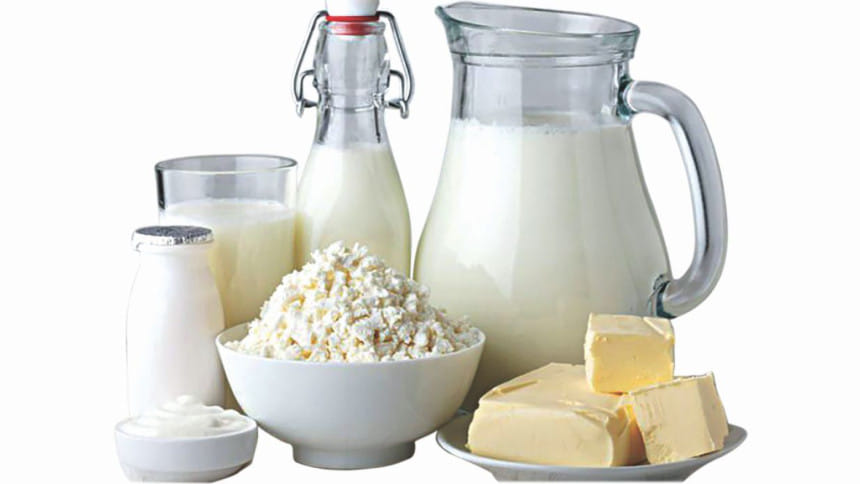Why milk matters

For all stages of life, milk is nature's elixir for good health. Milk and other dairy foods are densely packed with antioxidants, vitamins and minerals. Nearly every milk ingredient contains antioxidant properties and many of milk's antioxidants come in milk's unique fat and protein packages, having a set of superpowers that other superfoods cannot offer.
Milk may not be the most striking superfood, but it's certainly a contender for the title of being the best. Although this superfood is a crucial requirement for all ages, there persist many misconceptions about the way we consume milk in our diet, which results in the gradual deterioration of bone health and causes different calcium deficiency diseases.
The requirement of milk in our diet begins from the very instant of being born. A study by BIRDEM called the “Dietary Guidelines for Bangladesh” suggests that the breastfeeding process starts as soon as the mother recovers from delivery, which is typically an hour. From that moment on till the next 6 months, the baby is exclusively breastfed and no other fluid or food is required for the child. After the trial of 6 months, it is advised to introduce the child to appropriate complementary foods along with breastmilk. Breastmilk contains a substance called “whey” which contains “lactoferrin” that reduces the risk of infections in the child.
A research study led by Unicef on Child and Maternal Nutrition in Bangladesh has found that in Bangladesh, the overall rate of exclusive breastfeeding until 6 months is only 43 percent and the initiation of breastfeeding in the first hour is only 24 percent. Irregularity exists even in introducing complementary foods to the child which is either too early or too late, differing in both quantity and quality. Changing cultural norms related to the discouragement of breastfeeding is still a fight that hasn't been won; however, the trend is expected to change with increasing awareness amongst women.
Milk also holds paramount importance in the growing stages of a child as it effectively develops the bones and improves the growth of a child. “A common misconception in our country is that most parents believe that milk is only compulsory till the age of 5-6 years and eventually the habit of drinking milk dies down,” says Tamanna Chowdhury, Principal Dietician at Apollo Hospitals Dhaka. This means that with the end of consumption of milk at the age of 5-6 years, the risks of calcium deficiency diseases and the chances of retardation of growth and development also increase. Commonly, parents tend to be unaware of the fact that the growth period of a child ends around the age of 18 years. This means that milk is compulsory in the diet of a child till the age of 18 years, when the growth period typically tends to end.
“Milk is the source of calcium, phosphorous and a type of protein that gets absorbed well into the body and has high biological value. In order to fulfill the requirement for calcium in a child's body, milk holds utmost importance,” adds Tamanna Chowdhury.
But is milk exclusively important for just children? What about adults? To this, Tamanna Chowdhury replies, “Milk is essential even after the age of 18, in order to fulfill the daily requirement of essential nutrients like vitamins, minerals and protein. However, the serving size of milk reduces depending on the amount of physical activity by the individual. In addition to that, to prevent osteoporosis in the future, consumption of milk is crucial.”
According to the recommendations of the World Health Organization (WHO), 250ml of milk should be consumed by per person per day, or approximately 90 litres by per person per year. In reality, the consumption of milk in Bangladesh stands at 16.5 litres/person/year. On average, that is one fourth of the WHO recommended amount—which means that the risks of osteoporosis and other calcium deficiency diseases are on the rise amongst Bangladeshis.
The risk of osteoporosis increases at the age of 35-40 when women and the elderly are largely at risk. Women go through menopause, causing low hormone levels and no or infrequent menstrual periods can cause loss of bone mass. As a result, their calcium demand increases. “If a woman is planning for pregnancy, then the requirement of milk increases. Of course, during the period of pregnancy and lactation milk is important. If milk is present in a woman's diet during these stages, then chances of osteoporosis in the future decrease,” says Ms Tamanna. For adults, milk is a daily nutritional requirement. The requirement of milk returns to that of the growth period again in late adulthood, especially after the age of 55 before going into the stage of geriatric nutrition.
But what would the requirement of milk be for individuals with high cholesterol and lactose intolerance? Ms Tamanna says, “If you look at recent research studies and health guidelines in America and Europe, you'll find that they are focusing on reducing the percentage of fat in milk in children's consumption after the age of 5-12 years. Children of 18 years are recommended to drink milk containing 1 or 2 percent fat. In our country, it has been observed that only when patients are diagnosed with diseases, they avoid milk. But options for skim milk and low fat milk exist in Bangladesh as well as for patients.”
Often people have misconceptions about low fat milk, thinking that reduction of fat in milk means other nutrients in milk are absent as well but essentially only the percentage of fat is decreased. Rather, compared to normal milk, low fat milk contains more calcium and protein as by removing fat from the milk, the concentration of other ingredients increases.
While many varieties of milk exist in the market, full-cream powdered milk is becoming increasingly popular in the country. However, Ms Tamanna adds an interesting contrast saying that food should be related to one's culture and eating habits. “Majority of Bangladeshis are non-vegetarians. Meaning, we consume a lot of protein which comes mostly from fish and meat and we typically use a lot of oil in cooking and thus we consume a lot of fat. If we additionally consume milk, then the fat content in our diets increases.” This means that in order to sustain the balance of the requirement of fat and other nutrients in our diets, we must consume milk that has lower fat content.
On the other hand, lactose intolerance is a condition that develops from birth and for those individuals the substitute of milk would be plant-based milk such as soy milk. But Ms Tamanna says that most cases of lactose intolerance in our country do not develop from birth. She says, “Most cases of lactose intolerance in our country developed in adulthood. Most people discontinue milk after the age of 5-6 which causes the functioning capability of the lactate enzyme in your body to decrease. And thus when the enzyme reduces in the body, it is unable to break down lactose, commonly found in dairy products.” Thus the problem is eventual; it doesn't start at the age of 40 but is rather an aggregate of the years of deterioration caused in the body due to the lack of milk.
In many cases, due to poor choices in our eating habits and lifestyle, our digestion capability decreases. “Eating late at night, staying up late, eating at odd hours, eating out too much, etc., cause our gastric intestinal tract to be dysfunctional. As a result, when someone drinks milk and has loose motion, they blame milk for it. But you need to make the habit of drinking milk every day.”
Another concern is the addition of substitutes that add flavour which promise to increase the power of milk and many other benefits. One wonders, how effective are these substitutes anyway? According to Ms Tamanna, it is completely unnecessary to increase the power of milk as it already has the benefits that the supplements promise. She says, “Only in situations of malnutrition or picky eaters, we suggest supplements so that they add flavour and encourage the child to drink milk. Many supplements use caffeine, which may reduce your iron absorption. It's better to use supplements if it is prescribed by a doctor or dietician.”
Clearly, saying that the importance of milk is astronomical is an understatement.
NAZIFA RAIDAH is a contributor to The Daily Star.

 For all latest news, follow The Daily Star's Google News channel.
For all latest news, follow The Daily Star's Google News channel. 



Comments